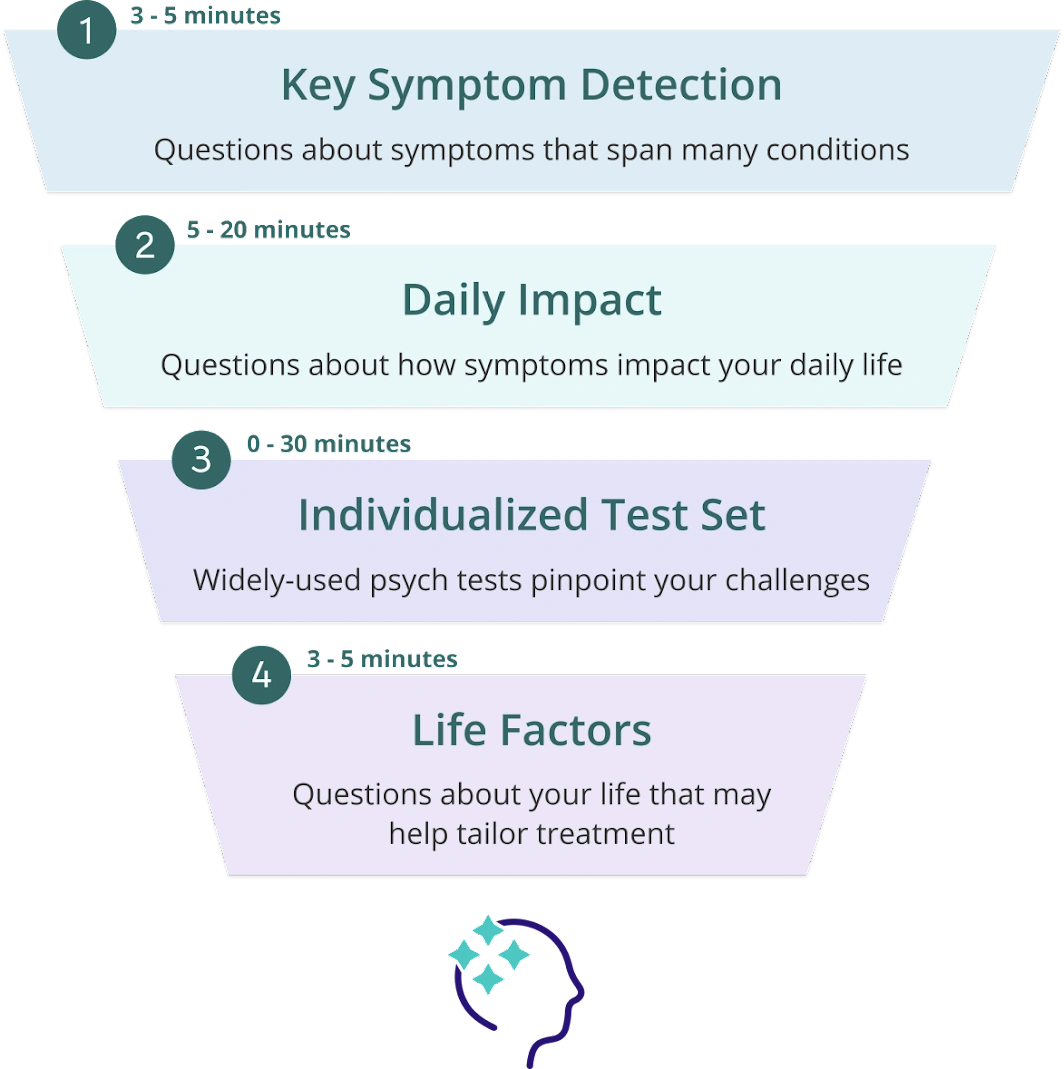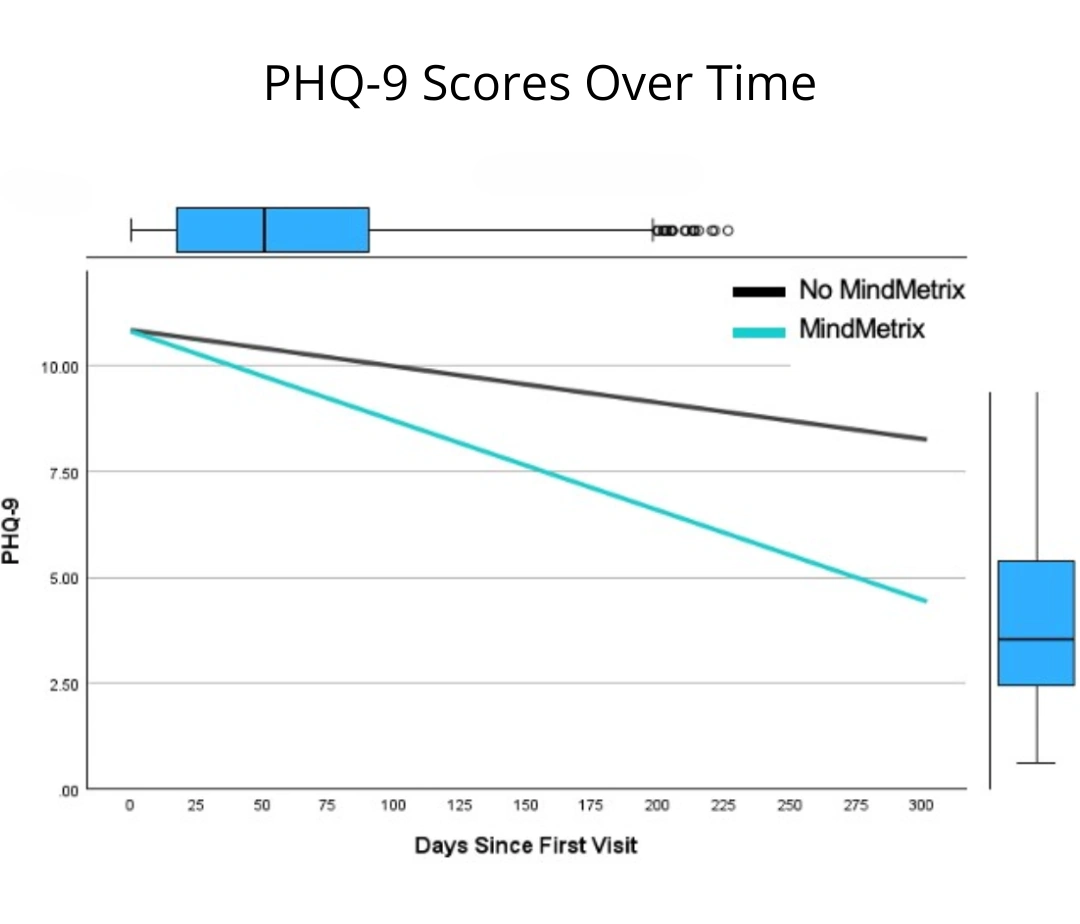Equipping healthcare providers with the right data to get results.
Rooted in science, our groundbreaking comprehensive mental health assessment drives collaboration between healthcare providers and individuals, arming them with the precise data they need to make informed treatment decisions.

The MindMetrix Story
Many of Dr. Young's patients had spent years and thousands of dollars on treatment with minimal relief before coming to RCBM. A large portion had been misdiagnosed. Knowing that a data-driven approach to diagnosis and treatment was needed, RCBM created a first-of-its-kind diagnostic screening program.
The program received overwhelmingly positive feedback, and RCBM became widely known for its diagnostic precision. In the throes of a mental health crisis in the US, we felt compelled to make this approach accessible to the public, and MindMetrix was born.
Meet the minds behind it.
We are a team of mental health professionals and researchers who are passionate about removing the barriers to high-quality mental health decisions.

Joel Young, MD
Dr. Young is the Medical Director and Founder of the Rochester Center for Behavioral Medicine. He co-founded MindMetrix with a goal of increasing access to high-quality diagnostic decisions. Dr. Young is certified by the American Board of Psychiatry and Neurology with added qualifications in geriatric, forensic and adolescent psychiatry. He serves as a Clinical Associate Professor of Psychiatry at the Wayne State University School of Medicine. Dr. Young has served as the primary investigator for more than 70 clinical trials, authoring over 100 articles, and has authored four books related to understanding adult mental illness.
Having devoted his career to helping patients find relief through a more nuanced understanding of their symptoms, Dr. Young was passionate about bringing his career's learnings to individuals struggling to get the care they needed. Comprehensive baseline screening is the cornerstone of the high quality care provided by his clinic. This insight inspired the idea of making thorough and scientific screening available to other providers through MindMetrix.

Jillian Fortain, Ph.D., LP, NCSP
Jillian (“Dr. Jill”) leads test content development at MindMetrix and doubles as director of Psychological Screening & Evaluation at the Rochester Center for Behavioral Medicine. She earned her BA degree in Psychology, with high honors, from the University of Michigan and Ph.D. in School Psychology from Michigan State University. She has worked with individuals of all ages in outpatient settings, and has expertise with diagnostics and evaluation of children, adolescents, and families in the public schools, in the juvenile justice system and in various non-profits.

Jaime Saal, MA, LPC, NCC
Jaime is a licensed mental health counselor and CEO of the Rochester Center for Behavioral Medicine, where she has worked over 15 years. In this capacity, Jaime co-created the diagnostic screening process that serves as the foundation for MindMetrix. Jaime is passionate about using data to make efficient and accurate clinical decisions, helping individuals to feel better, and reach their full potential. Jaime is certified in Executive Healthcare Leadership, bringing both business and clinical expertise to the MindMetrix team.

Richard Powell, PhD, JD
Dr. Powell is a statistician and principal outcomes researcher. He has proven experience in psychological rating scale development, validation, and has published novel tools for the measurement of ADHD symptoms. He maintains active practice in clinical mental health counseling & supervision while serving as an advisor to MindMetrix.
The assessment process
Four phases to get the full picture.
The MindMetrix Assessment begins with a broad online symptom screening, like a therapy intake session, and narrows down a set of possible mental health conditions it detects as you answer each question. It adjusts according to your responses, and goes on to measure your symptoms through a battery of industry-standard tests. These tests come with published precision statistics, which enable MindMetrix to show how well symptoms align with certain mental health conditions.

Key Symptom Detection
The Diagnostic Statistical Manual - 5th Edition (DSM-5) is the practitioner's authority on the symptom criteria for all mental health conditions. The first part of the MindMetrix assessment screens for symptoms associated with 50 common psychiatric conditions, as required by the DSM-5. This ensures co-occurring symptoms or conditions are not overlooked.
Daily Impact
Many people have some symptoms of various mental health conditions, but in order to determine whether they meet the level of clinical classification, it is important to understand the way these symptoms impact their daily life. The assessment asks what life looks like and how these symptoms affect the individual. This step generates a list of hypothesized conditions to test with a set of validated, psychometrically-sound screening tests.
Individualized Test Set
Complete a carefully selected set of widely-used tests which help confirm or invalidate hypotheses based on earlier responses. These tools are well-known in the mental health field. They are designed to measure your symptoms with statistical precision and establish whether they are consistent with certain mental health conditions.
This part of the assessment process is designed to obtain results with a high degree of confidence: Each assessed condition has a corresponding set of condition-specific tests (for example: ADHD-specific rating scales, Generalized Anxiety-specific rating scales, Depression-specific rating scales, etc.) that were chosen based on their published scientific rigor and ability to accurately detect the condition they measure.
Life Factors
Each individual has a unique history which contributes to how they are feeling and what their treatment plan may look like. In this section, a series of questions helps MindMetrix understand this history, and construct a personalized MindMetrix report.
Scientific rigor
Comprehensive data with statistically-backed findings.

MindMetrix uses probability statistics and the published precision rates of each screening tool (test) we incorporate. This allows us to present results with a high degree of credibility. The tests included in each condition's test-set were chosen based on their sensitivity (likelihood of a “true positive”) and specificity (likelihood of a “true negative”) for detecting a condition at a designated clinical cutoff score. These statistics are used to weight each test's result in context of the other tests in the set. We refer to this as your Elevated Likelihood, or how many times more likely you are, based on your results, to have the condition compared with the general U.S. adult population.

Minimize self-reporting error
Each individual psychometric test within the comprehensive flow was selected to work within a set of tests. This way, no single measure is relied upon. The published sensitivity/specificity statistics are used to weight each test's result in context of the other tests in the set. MindMetrix takes multiple approaches to ensuring the integrity of self-reported information.

Only the best psychological tests
We carefully curated over 60 researched & peer-reviewed psychological rating scales (tests), and built each condition's test set with a selection of scales that measure the construct of interest in theoretically different ways. For example, for ADHD, one test measures frequency and severity of an adult’s recalled childhood symptoms, while the other two measure life impact of ADHD symptoms over the last six months.
Strengths & limitations
MindMetrix informs treatment. It does not provide treatment.
The purpose of mental health screening is to indicate when a specific area of concern merits further evaluation by a qualified mental health professional. Screening assessments are not diagnostic tools.
MindMetrix cannot diagnose a psychiatric condition. Only a licensed healthcare provider can do that. But, what MindMetrix can do is to point to areas of potential clinical concern with a high degree of confidence, and map out a path forward - encouraging those who need it to partner with a healthcare provider to get the right treatment.

A step in the right direction
A MindMetrix report is not intended to be the last word on a person’s mental health, but, rather, a step toward seeking high-quality professional guidance, when indicated. For some people, receiving MindMetrix information can come as a relief; Just knowing that others have similar symptoms and that treatment options may be available can offer hope and motivation.

A brave path forward
Many people are on the fence for years about reaching out for help, or have tried and run into barriers - either in access or costs. They may struggle needlessly with distressing symptoms before summoning the energy to seek a remedy. Shame, denial, and stigma are common hurdles that may slow down or derail forward movement. Once they decide to formally seek help, they may encounter delays and confusion in locating that help. MindMetrix can not fix the system, but it can can offer a path forward, today.

A new way to receive the right care
If you are currently working with a healthcare provider (therapist, Primary Care Physician, OBGyn, etc...), or will be in the future, we encourage you to share your MindMetrix report with them. MindMetrix was created by a team of seasoned behavioral health practitioners who understand that providers of all types rely on good data (and lots of it) to make informed decisions and provide the best possible care for you.
Our latest insights
Rooted in science and data, MindMetrix is commited to furthering our understanding of the human condition.

How Comprehensive Screening Impacts Patient Experience
Learn about what patients care about when it comes to getting a proper diagnosis.

Preventing ADHD Under- and Over-Diagnosis
Learn the factors that can help improve the accuracy of ADHD diagnoses.

MindMetrix Outcomes Study
Comprehensive mental health assessment with MindMetrix is associated with improved patient outcomes.
Privacy is paramount.
We know that mental health matters are of utmost confidentiality. We take data privacy very seriously, and work out of an abundance of caution.